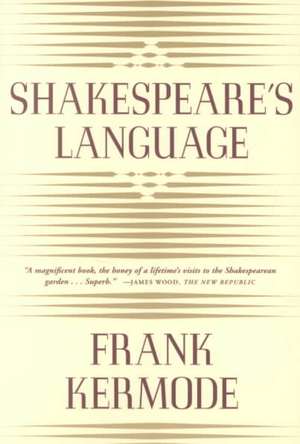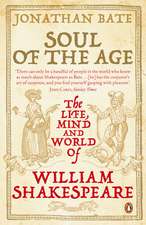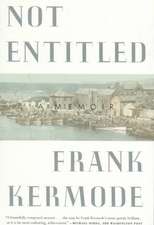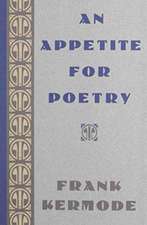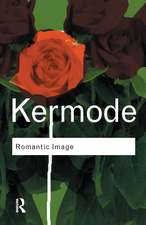Shakespeare's Language
Autor Frank Kermodeen Limba Engleză Paperback – 31 iul 2001
A magnum opus from our finest interpreter of The Bard
The true biography of Shakespeare--and the only one we need to care about--is in his plays. Frank Kermode, Britain's most distinguished scholar of sixteenth-century and seventeenth-century literature, has been thinking about Shakespeare's plays all his life. This book is a distillation of that lifetime of thinking.The finest tragedies written in English were all composed in the first decade of the seventeenth century, and it is generally accepted that the best ones were Shakespeare's. Their language is often difficult, and it must have been hard even for contemporaries to understand. How did this language develop? How did it happen that Shakespeare's audience could appreciate Hamlet at the beginning of the decade and Coriolanus near the end of it?
In this long-awaited work, Kermode argues that something extraordinary started to happen to Shakespeare's language at a date close to 1600, and he sets out to explore the nature and consequences of the dynamic transformation that followed. For it is in the magnificent, suggestive power of the poetic language itself that audiences have always found meaning and value. The originality of Kermode's argument, the elegance and humor of his prose, and the intelligence of his discussion make this a landmark in Shakespearean studies.
The true biography of Shakespeare--and the only one we need to care about--is in his plays. Frank Kermode, Britain's most distinguished scholar of sixteenth-century and seventeenth-century literature, has been thinking about Shakespeare's plays all his life. This book is a distillation of that lifetime of thinking.The finest tragedies written in English were all composed in the first decade of the seventeenth century, and it is generally accepted that the best ones were Shakespeare's. Their language is often difficult, and it must have been hard even for contemporaries to understand. How did this language develop? How did it happen that Shakespeare's audience could appreciate Hamlet at the beginning of the decade and Coriolanus near the end of it?
In this long-awaited work, Kermode argues that something extraordinary started to happen to Shakespeare's language at a date close to 1600, and he sets out to explore the nature and consequences of the dynamic transformation that followed. For it is in the magnificent, suggestive power of the poetic language itself that audiences have always found meaning and value. The originality of Kermode's argument, the elegance and humor of his prose, and the intelligence of his discussion make this a landmark in Shakespearean studies.
| Toate formatele și edițiile | Preț | Express |
|---|---|---|
| Paperback (2) | 58.68 lei 23-34 zile | +21.35 lei 6-10 zile |
| Penguin Books – 4 apr 2001 | 58.68 lei 23-34 zile | +21.35 lei 6-10 zile |
| Farrar, Straus and Giroux – 31 iul 2001 | 148.08 lei 6-8 săpt. |
Preț: 148.08 lei
Nou
Puncte Express: 222
Preț estimativ în valută:
28.33€ • 29.59$ • 23.40£
28.33€ • 29.59$ • 23.40£
Carte tipărită la comandă
Livrare economică 16-30 aprilie
Preluare comenzi: 021 569.72.76
Specificații
ISBN-13: 9780374527747
ISBN-10: 0374527741
Pagini: 256
Dimensiuni: 140 x 213 x 23 mm
Greutate: 0.44 kg
Ediția:First.
Editura: Farrar, Straus and Giroux
ISBN-10: 0374527741
Pagini: 256
Dimensiuni: 140 x 213 x 23 mm
Greutate: 0.44 kg
Ediția:First.
Editura: Farrar, Straus and Giroux
Notă biografică
Frank Kermode has written and edited many works, among them Forms of Attention and a memoir, Not Entitled. He lives in Cambridge, England, and has frequently taught in the United States.
Descriere
In this magnum opus, Britain's most distinguished scholar of 16th-century and 17th-century literature restores Shakespeare's poetic language to its rightful primacy.
